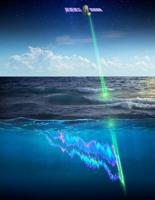In the gateway to the Arctic, fat and sea ice are crucial, intertwined and dwindling. And scientists say because of that polar bears are in trouble. In Churchill, Canada, the polar bear capital of the world, scientists say there are now about half the polar bears as there were 40 years ago. Polar bears are losing sea ice that they use as a base for seal hunting, so they are going hungry longer in the summer. Even tiny plankton, the base of the food web, is going low fat. And that's bad for the region because fat is crucial for survival here.
Robert Rutherford, the founder of the San Francisco Bay Area-based environmental education organization Marine Science Institute has died.
A new study using a NASA satellite instrument orbiting Earth has found that small, environmental changes in polar food webs significantly influence the boom-and-bust cycles of phytoplankton. These findings will supply important data for ecosystem management, commercial fisheries and our understanding of the interactions between Earth’s climate and key ocean ecosystems, NASA said.



